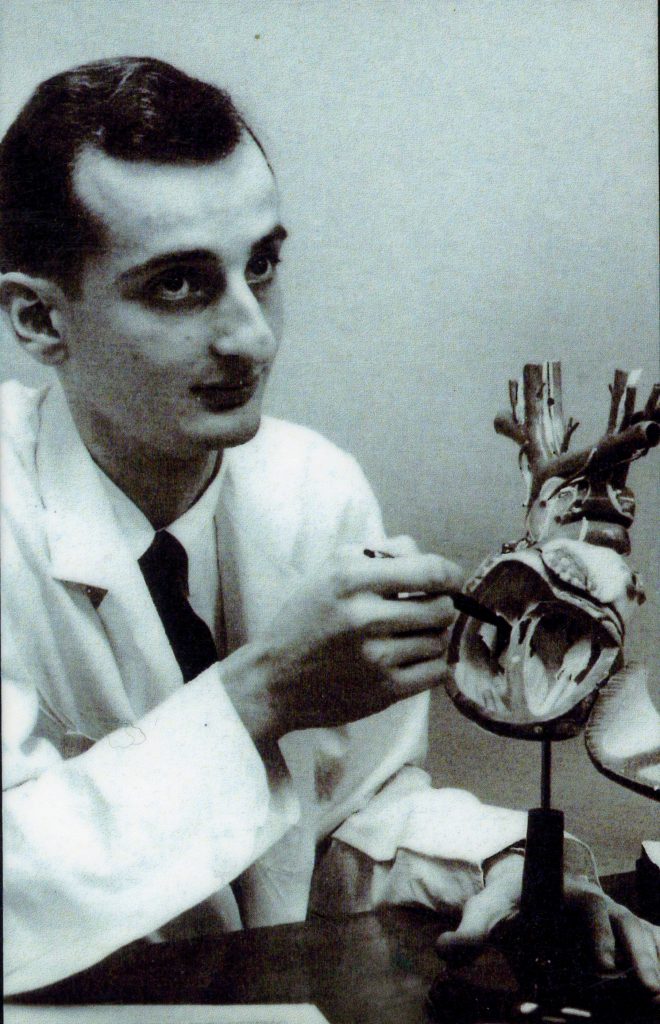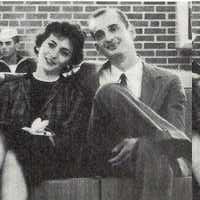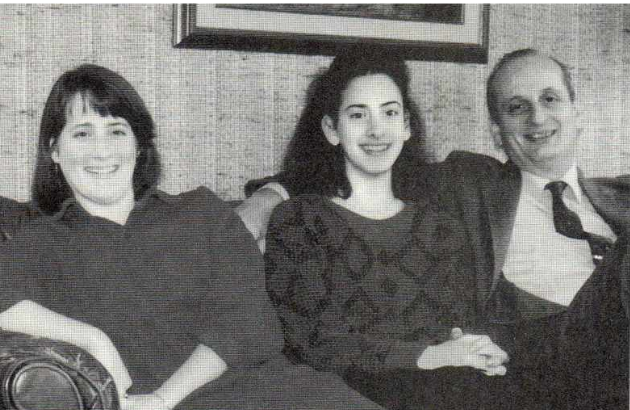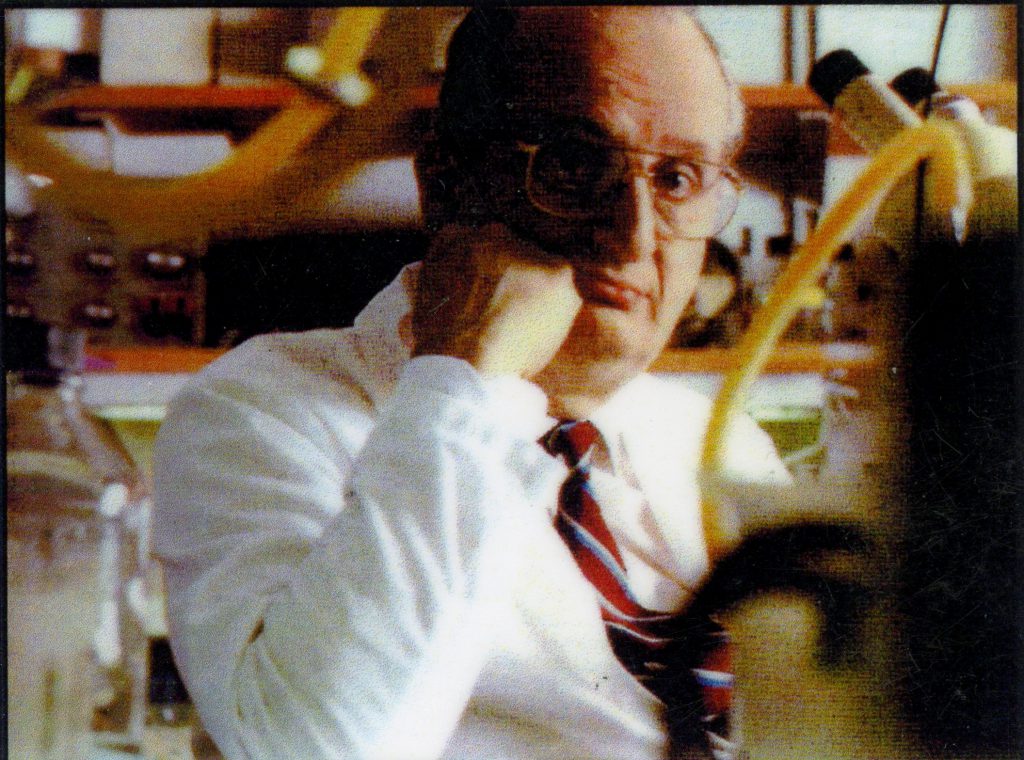A rabbi-like doctor, full of warmth and humanity, imagination and persistence. He gifted the world with his gentle and determined magic.

Incredible! As a teenager at Bexley High School, he kept a rat heart beating outside the body using a bicycle pump and his sister’s toy oven as an incubator and received a prize from The Ohio Academy of Sciences in their annual competition.
Judah’s grandpa, Benjamin, offered to buy him a World War II jeep as a bar mitzvah gift, but he chose a thousand-power microscope – just what every teenager would want!
He became obsessed with the tiny world revealed through this instrument. Family friend Geoffrey Stern related that it was not unusual for Judah to be in his bedroom or basement laboratory looking at specimens while his parents served guests at the Shabbat table.
Moses Judah Folkman was born in 1933 in Cleveland, Ohio. He went by his middle name – Judah. His parents were Rabbi Jerome Daniel and Bessie Schomer Folkman1. In 1947, Judah moved with his family to Bexley, Ohio, when his father became rabbi at the new Temple Israel. Judah was the first child to have a bar mitzvah at the Temple. His father’s special blessing and message to his son was, “be a credit to your people.”
Judah’s interest in medicine was sparked when he accompanied his father on hospital visits. He had considered being a rabbi, but at age ten, he told his father of his decision to become a doctor. Rabbi Folkman’s surprise answer was, “no, you can be a “rabbi-like doctor.” These were words Judah took to heart.
He graduated from Bexley High School in June 1950. In June 2000, Dr. Folkman returned to his alma mater to give the commencement address. He acknowledged several Bexley teachers who gave him both inspiration and tenacity in research. They taught him to test all hypotheses and never give up.
John F. Schacht, his high school math teacher, and Coach Carlton Smith, who taught him chemistry, had the ability to guide and motivate students. One day an extra-credit project sent Coach Smith and Judah to the physics lab to identify an unknown element. By now, late for football practice, Coach Smith kept prodding Judah to investigate further. After an hour of study, he came to a conclusion. The outcome was a breakthrough for this young student: physics and chemistry were connected. Judah’s enchantment with all things medical and scientific grew, “For the rest of my life and career, I looked for connections between things.”
While a pre-med student at The Ohio State University, he caught the attention of Dr. Robert Zollinger, a highly accomplished surgeon and nationally prominent author of medical textbooks. Dr. Zollinger, a Bexley resident, exerted a great deal of influence on Judah and became his mentor. Folkman co-authored papers on liver cancer and, in 1953, received his B.A., cum laude, from OSU. He was accepted at Harvard Medical School, where he developed the first atrioventricular implantable pacemaker, an accomplishment that won him his first in a long list of scientific awards, including the Boston Undergraduate Award in Medicine. Judah graduated magna cum laude from Harvard Medical School in 1957.

This aspiring young doctor fell in love and married a talented vocalist with the Boston Symphony Chorus, Paula Paril: “He told me he loved me every single day of our marriage.” Paula said that her husband did not care about fame and fortune, being a self-confessed ‘science nerd’. She found it necessary to put money in Judah’s wallet so that he could buy lunch.
They had two daughters: Laura trained as a teacher and became the mother of their only grandchild. Marjorie enjoyed a successful career as a dancer.

Between 1960 and 1962, Folkman served in the U.S. Navy with the rank of Lieutenant. During this time, he studied blood vessel growth at the National Naval Medical Center in Bethesda, Maryland and invented an implantable device for timed drug release. He donated it, patent-free, to the World Population Council. This device contributed to what is now known as Norplant.
In 1971, he wrote of his theory that all cancer tumors were angiogenesis-dependent: If a tumor could be stopped from growing its own blood supply, it would wither and die. After more than a decade, his theory became widely accepted. Dr. Folkman was considered the founder of the angiogenesis field of study, a fourth way of treating cancer, supplementing radiation, chemotherapy and surgery.
Judah was appointed the Julia Dyckman Andrus Professor of Pediatric Surgery at Harvard Medical School in 1968, where he was also a professor of cell biology. He directed Children’s Hospital Boston Surgical Laboratories for nearly 40 years. He was a member of the National Academy of Sciences, the Institute of Medicine, The National Academy of Arts and Sciences, and the American Philosophical Society, among others. He authored some 400 papers and more than 100 book chapters. In the United States, he received scores of awards and honors for his research, as well as numerous international awards, including:
- Canada’s Gairdner Foundation International Award,
- Israel’s Wolf Foundation Prize in Medicine,
- Germany’s Ernest Schering Prize,
- the United Kingdom Society for Endocrinology’s Dale Medal, and
- Switzerland’s Dr. Joseph Steiner Cancer Research Award.
“You trusted him. You respected his judgment. …you’re dealing with one of the greatest minds in the country.” observed Bruce Zettler, chief scientific officer.

He also became a noteworthy professor whose students at Harvard Medical School counted him among their best teachers. He conveyed to his students the importance of staying connected to patients.
- As a doctor, he gave his phone number and beeper number to his patients so they could contact him.
- As a surgeon, he believed there was no such thing as false hope.
He advised his students never to tell a patient that there was nothing they could do to help, because there was always something – even if it was only making the patient feel better. Judah, the rabbi-like doctor, fulfilled his father’s blessing given at his bar mitzvah, “be a credit to your people“.
1981, Folkman reluctantly retired from his surgery career to concentrate on the search for angiogenesis inhibitors. Various agents and inhibitors were developed in his lab during the 1980s and 1990s. He helped develop nearly 100 patents. In 2006, Folkman was one of seven people appointed by President Bush to the National Cancer Advisory Board of the National Institutes of Health.
His honors and awards began in Bexley High School and continued throughout his illustrious career. In 2001, he was awarded the Benjamin Franklin Medal of Life Science. Dr. Folkman’s life seemed to echo Dr. Franklin’s, the great scientist and inventor of the 1700s, who said, “… if only the day were longer, maybe I could get something done.”
Research and text by Edie Mae Herrel and Nancy Beck
Photos from the Edie Mae Herrel collection
1See article at Rabbi Jerome Folkman – Faith Leader
If you have information to add to this topic, please let us know.
All comments are reviewed before posting.
